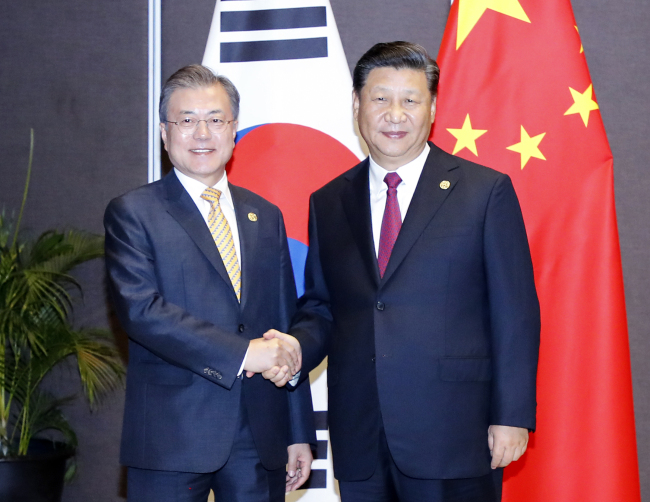China not likely to play active role in US-NK nuclear talks: experts
By Jung Min-kyungPublished : Nov. 18, 2018 - 16:24
Expectations are mounting over how China will use its clout to push North Korea back to dialogue with the US, after the leaders of China and South Korea agreed to cooperate to bring about a possible second US-North Korea summit. But experts are skeptical that China will play an active role, considering its ongoing trade war with the US.
On the sidelines of the Asia Pacific Economic Cooperation forum in Papua New Guinea on Saturday, South Korean President Moon Jae-in and his Chinese counterpart, Xi Jinping, agreed to closely cooperate on a possible second US-North Korea summit, according to the presidential office.

Xi also intends to visit North Korea next year after receiving an invitation from North Korean leader Kim Jong-un, Cheong Wa Dae added.
With relations between Beijing and Pyongyang having seemingly thawed and with China appearing to have relaxed the enforcement of sanctions against North Korea, many anticipate that Xi’s remarks mean that China will actively cooperate to advance US-North Korea dialogue on denuclearization.
However, analysts claim that with the US and China both focused on gaining leverage ahead of the G-20 meeting in Buenos Aires that kicks off on Nov. 30, China is unlikely to do much.
“If Beijing wanted to play a constructive role in helping US-North Korea dialogue move forward, they would have discussed it with Washington or Pyongyang,” said Shin Beom-cheol, a research fellow at the Asan Institute for Policy Studies.
“China is currently in an opposing position to the US, with the ongoing trade war, and to play a ‘positive’ role in the denuclearization talks would mean siding with the US -- which won’t be happening. But to maintain its role in the North Korea issue, it may try to use its influence over Pyongyang without overstepping, in making the North return to the negotiation table with Washington,” he added.
The right platform for China to engage in the issues surrounding the Korean Peninsula has yet to be established, experts also noted. China has been seeking to be a part of the process for an end-of-war declaration on the peninsula, but with the US and North Korea failing to reach a consensus on a list of concessions for Pyongyang’s denuclearization, it is too early to raise the topic at the table.
“It’s not the right moment for China to actively engage in the issues surrounding the peninsula. It seems Beijing is controlling the level of its sanctions enforcement on North Korea depending on how the trade war progresses and using the North Korea situation as a card,” said Kim Hyun-wook from the Korea National Diplomatic Academy.
Washington and Pyongyang have been seeking to arrange a second summit between US President Donald Trump and Kim to make headway on Pyongyang’s denuclearization. But overall progress in the negotiations has been lackluster.
As international sanctions on North Korea remain intact, China is Pyongyang’s sole major ally and a key economic lifeline for the isolated country.
Meanwhile, North Korea seems to be eyeing economic development amid a thaw in its ties with China.
Kim Jong-un recently ordered the development of Sinuiju, a city on the border with China, according to the North’s state-run Korean Central News Agency on Friday. Shinuiju is expected to serve as a key hub for economic cooperation between the North and China. Backed by the recent development in its relations with China, North Korea is expected to aggressively pursue the development of the city, analysts say.
By Jung Min-kyung (mkjung@heraldcorp.com)








![[Graphic News] More Koreans say they plan long-distance trips this year](http://res.heraldm.com/phpwas/restmb_idxmake.php?idx=644&simg=/content/image/2024/04/17/20240417050828_0.gif&u=)
![[KH Explains] Hyundai's full hybrid edge to pay off amid slow transition to pure EVs](http://res.heraldm.com/phpwas/restmb_idxmake.php?idx=644&simg=/content/image/2024/04/18/20240418050645_0.jpg&u=20240419100350)






![[From the Scene] Monks, Buddhists hail return of remains of Buddhas](http://res.heraldm.com/phpwas/restmb_idxmake.php?idx=652&simg=/content/image/2024/04/19/20240419050617_0.jpg&u=20240419175937)

![[KH Explains] Hyundai's full hybrid edge to pay off amid slow transition to pure EVs](http://res.heraldm.com/phpwas/restmb_idxmake.php?idx=652&simg=/content/image/2024/04/18/20240418050645_0.jpg&u=20240419100350)

![[Today’s K-pop] Illit drops debut single remix](http://res.heraldm.com/phpwas/restmb_idxmake.php?idx=642&simg=/content/image/2024/04/19/20240419050612_0.jpg&u=)